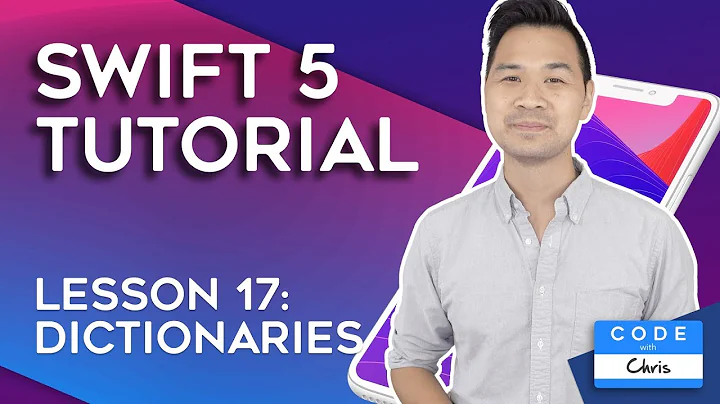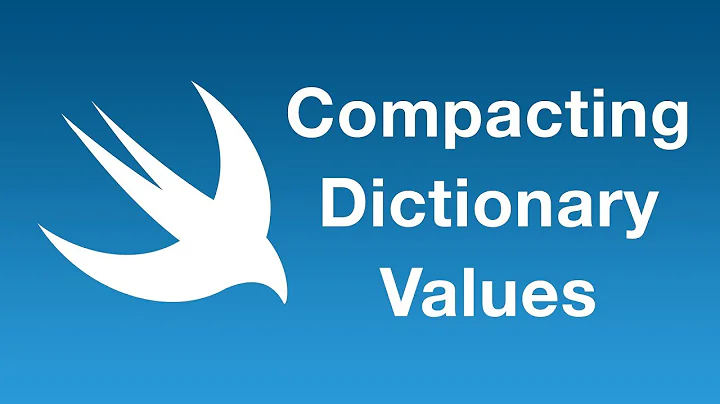How to add nil value to Swift Dictionary?
Solution 1
How to add
nilvalue to Swift Dictionary?
Basically the same way you add any other value to a dictionary. You first need a dictionary which has a value type that can hold your value. The type AnyObject cannot have a value nil. So a dictionary of type [String : AnyObject] cannot have a value nil.
If you had a dictionary with a value type that was an optional type, like [String : AnyObject?], then it can hold nil values. For example,
let x : [String : AnyObject?] = ["foo" : nil]
If you want to use the subscript syntax to assign an element, it is a little tricky. Note that a subscript of type [K:V] has type V?. The optional is for, when you get it out, indicating whether there is an entry for that key or not, and if so, the value; and when you put it in, it allows you to either set a value or remove the entry (by assigning nil).
That means for our dictionary of type [String : AnyObject?], the subscript has type AnyObject??. Again, when you put a value into the subscript, the "outer" optional allows you to set a value or remove the entry. If we simply wrote
x["foo"] = nil
the compiler infers that to be nil of type AnyObject??, the outer optional, which would mean remove the entry for key "foo".
In order to set the value for key "foo" to the AnyObject? value nil, we need to pass in a non-nil outer optional, containing an inner optional (of type AnyObject?) of value nil. In order to do this, we can do
let v : AnyObject? = nil
x["foo"] = v
or
x["foo"] = nil as AnyObject?
Anything that indicates that we have a nil of AnyObject?, and not AnyObject??.
Solution 2
You can use the updateValue method:
postDict.updateValue(nil, forKey: surname)
Solution 3
As documented in here, setting nil for a key in dictionary means removing the element itself.
If you want null when converting to JSON for example, you can use NSNull()
var postDict = Dictionary<String,AnyObject>()
postDict["pass"]=123
postDict["name"]="ali"
postDict["surname"]=NSNull()
let jsonData = NSJSONSerialization.dataWithJSONObject(postDict, options: NSJSONWritingOptions.allZeros, error: nil)!
let jsonString = NSString(data: jsonData, encoding: NSUTF8StringEncoding)!
// -> {"pass":123,"surname":null,"name":"ali"}
Solution 4
postDict[surname] = Optional<AnyObject>(nil)
Solution 5
You can use the Optional type
var postDict = ["pass": 123, "name": "ali", "surname": Optional()]
Related videos on Youtube
yatanadam
Updated on September 16, 2020Comments
-
yatanadam over 3 years
I have made a request to my server in my app. And posted data something like this.Server side is waiting for all parameters even they are nil. But i couldn't add nil values to dictionary.
var postDict = Dictionary<String,AnyObject> postDict[pass]=123 postDict[name]="ali" postDict[surname]=nil // dictionary still has only pass and name variables.Is there a way to add nil value to dictionary ?
-
 The Paramagnetic Croissant over 9 yearsWhen you assign
The Paramagnetic Croissant over 9 yearsWhen you assignnilto a key, it will returnnilnext time you access that key (because it removes the object and the removed object is not there). If you want to represent a non-nilnull value, you can useNSNull(). -
 Jérôme Teisseire over 9 yearsuse [NSNull null] or nothing.
Jérôme Teisseire over 9 yearsuse [NSNull null] or nothing. -
 Abizern over 9 yearsThis isn't even a swift question; putting NSNull instances in a dictionary to represent empty values is part of Foundation.
Abizern over 9 yearsThis isn't even a swift question; putting NSNull instances in a dictionary to represent empty values is part of Foundation.
-
-
 Franklin Yu about 8 yearsThis solution is so much more Swifty than
Franklin Yu about 8 yearsThis solution is so much more Swifty thanNSNull()! -
Raginmari almost 8 yearsIt's a little easier to use and more readable if you define this "Null" object as a constant:
static let NullObject: AnyObject?? = Optional(nil) -
ramazan polat over 7 yearsDont know why this is downvoted but this is the best way to do it imho.
-
RenniePet over 7 yearsWhose bright idea was it that assigning nil to a dictionary entry means remove the entry, even when nil is a valid entry when the dictionary is defined as having AnyObject? or Any? entries? That just cost me several hours and lowered my opinion of Swift a couple of notches.
-
 Franklin Yu over 7 yearsFirst line should be
Franklin Yu over 7 yearsFirst line should bevar dict = [Int: Int?](). It's a definition, not just a declaration. -
 Andrea about 7 yearsThe correct answer is the one from Guiller, by setting nil a value using subscript you remove the value anche the key, while using the function
Andrea about 7 yearsThe correct answer is the one from Guiller, by setting nil a value using subscript you remove the value anche the key, while using the functionupdateValueyou can set the value to nil while keeping the key. -
 Bartłomiej Semańczyk over 6 yearsThis is the best answer I have ever seen on SA. You should be gifted with 1 million battles of wine;) I have created a bounty and I will award it to you within 24 hours;)
Bartłomiej Semańczyk over 6 yearsThis is the best answer I have ever seen on SA. You should be gifted with 1 million battles of wine;) I have created a bounty and I will award it to you within 24 hours;) -
 Martin R over 6 years@BartłomiejSemańczyk: Then you should have chosen "One or more of the answers is exemplary and worthy of an additional bounty." as the bounty reason. Now it looks as if you are looking for another/better answer.
Martin R over 6 years@BartłomiejSemańczyk: Then you should have chosen "One or more of the answers is exemplary and worthy of an additional bounty." as the bounty reason. Now it looks as if you are looking for another/better answer. -
 Bartłomiej Semańczyk over 6 years@MartinR you are right, I would change the reason of bounty but I cannot. Nice learn to me;)
Bartłomiej Semańczyk over 6 years@MartinR you are right, I would change the reason of bounty but I cannot. Nice learn to me;) -
 Jakub Truhlář about 6 yearsGood point. It's confusing, but the point is indeed use
Jakub Truhlář about 6 yearsGood point. It's confusing, but the point is indeed use= nil as Foo?. -
Max over 5 yearsIn most (all?) cases you don't even need the
<AnyObject>. It should be able to infer the type. -
 Li Jin over 4 yearsThis is a very right answer for setting
Li Jin over 4 yearsThis is a very right answer for settingnilvalue for a key. -
user2101384 about 3 yearsx["foo"] = nil will delete the entry "foo". x["foo"]! = nil will se the value of the entry "foo" to nil. x["bar"] = nil will not insert any entry. x["bar"]! = nil will blow up. x.updateValue( nil, forKey: "bar" ) will add entry "bar" to x with value nil, as pointed in the @Guiller answer.
-
user2101384 about 3 yearsx["foo"] = nil as Any? also works. But I think updateValue(nil, forKey: "foo") is easier to understand for people who is junior or getting started with swift.






